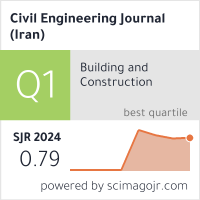Fundamental Challenges and Management Opportunities in Post Disaster Reconstruction Project
Downloads
Doi:10.28991/CEJ-2023-09-09-05
Full Text:PDF
Downloads
[2] Lopez, E. V., & Alexander, J. F. (2023). The project management profession: Current state of U.S. Graduate programs. Journal of Education for Business, 98(4), 186–191. doi:10.1080/08832323.2022.2105781.
[3] Zhao, L., Xu, G., Cui, Y., Kong, F., Gao, H., & Zhou, X. (2023). Post-Disaster Restoration and Reconstruction Assessment of the Jiuzhaigou Lake Landscape and a Resilience Development Pathway. International Journal of Environmental Research and Public Health, 20(5), 3957. doi:10.3390/ijerph20053957.
[4] Van Wyngaard, C. J., Pretorius, J. H. C., & Pretorius, L. (2012). Theory of the triple constraint 2014; A conceptual review. 2012 IEEE International Conference on Industrial Engineering and Engineering Management. doi:10.1109/ieem.2012.6838095.
[5] Al-Qaicy, S. T., & Breesam, H. K. (2021). An Analytical Study to Evaluate Iraqi Construction Sector Readiness to Manage Post-Disaster Reconstruction. Journal of Physics: Conference Series, 1804(1), 012014. doi:10.1088/1742-6596/1804/1/012014.
[6] Chang-Richards, Y. A., Rapp, R., Wilkinson, S., von Meding, J., & Haigh, R. (2017). Disaster recovery project management: A critical service. International Journal of Project Management, 35(5), 783–787. doi:10.1016/j.ijproman.2017.03.003.
[7] Sospeter, N. G., Rwelamila, P. M. D., & Gimbi, J. (2021). Project management challenges for post-disaster reconstruction projects in Angola: a public sector perspective. International Journal of Managing Projects in Business, 14(3), 767–787. doi:10.1108/IJMPB-03-2020-0087.
[8] Johnson, C., Lizarralde, G., & Davidson, C. H. (2006). A systems view of temporary housing projects in post-disaster reconstruction. Construction Management and Economics, 24(4), 367–378. doi:10.1080/01446190600567977.
[9] Enshassi, A., Al-Najjar, J., & Kumaraswamy, M. (2009). Delays and cost overruns in the construction projects in the Gaza Strip. Journal of Financial Management of Property and Construction, 14(2), 126–151. doi:10.1108/13664380910977592.
[10] Tumi, S. A. H., Omran, A., & Pakir, A. H. K. (2009). Causes of delay in construction industry in Libya. The International Conference on Economics and Administration, 14-15 November, 2009, Bucharest, Romania.
[11] Sweis, G., Sweis, R., Abu Hammad, A., & Shboul, A. (2008). Delays in construction projects: The case of Jordan. International Journal of Project Management, 26(6), 665–674. doi:10.1016/j.ijproman.2007.09.009.
[12] Al-Momani, A. H. (2000). Construction delay: a quantitative analysis. International Journal of Project Management, 18(1), 51–59. doi:10.1016/s0263-7863(98)00060-x.
[13] Aziz, R. F. (2013). Ranking of delay factors in construction projects after Egyptian revolution. Alexandria Engineering Journal, 52(3), 387–406. doi:10.1016/j.aej.2013.03.002.
[14] Assaf, S. A., & Al-Hejji, S. (2006). Causes of delay in large construction projects. International Journal of Project Management, 24(4), 349–357. doi:10.1016/j.ijproman.2005.11.010.
[15] Alkhathami, M. M. (2004). Examination of the correlation of critical success and delay Factors in construction projects in the kingdom of Saudi Arabia. PhD Thesis, University of Pittsburgh, Pittsburgh, United States.
[16] Al Hammadi, S., & Nawab, M. S. (2016). Study of delay factors in construction projects. International Advanced Research Journal in Science, Engineering and Technology, 3(4), 87-93.
[17] Sepasgozar, S. M. E., Karimi, R., Shirowzhan, S., Mojtahedi, M., Ebrahimzadeh, S., & McCarthy, D. (2019). Delay Causes and Emerging Digital Tools: A Novel Model of Delay Analysis, Including Integrated Project Delivery and PMBOK. Buildings, 9(9), 191. doi:10.3390/buildings9090191.
[18] Alaghbari, W., Razali A. Kadir, Mohd., Salim, A., & Ernawati. (2007). The significant factors causing delay of building construction projects in Malaysia. Engineering, Construction and Architectural Management, 14(2), 192–206. doi:10.1108/09699980710731308.
[19] Fugar, F. D., & Agyakwah-Baah, A. B. (2010). Delays in Building Construction Projects in Ghana. Australasian Journal of Construction Economics and Building, 10(1/2), 103. doi:10.5130/ajceb.v10i1/2.1592.
[20] Afram, S. O., Bangdome-Dery, A., Eghan, G. E., & Kwofie, T. E. (2015). Analysis of Causes of Delay in Middle and High Income Self-Build Housing Projects (SBHPs) in WA, Ghana. Journal of Building Construction and Planning Research, 3(4), 171–179. doi:10.4236/jbcpr.2015.34017.
[21] Sospeter, N. G., Rwelamila, P. D., & Gimbi, J. J. (2021). A conceptual framework for managing post-disaster reconstruction projects in emerging economies: the case of Angola. Built Environment Project and Asset Management, 12(2), 205–222. doi:10.1108/bepam-03-2021-0040.
[22] Bekr, G. A. (2015). Causes of Delay in Public Construction Projects in Iraq. Jordan Journal of Civil Engineering, 9(2), 149-162.
[23] Waheeb, R. A., & Andersen, B. S. (2021). Causes of Problems in Post-Disaster Emergency Re-Construction Projects”Iraq as a Case Study. Public Works Management; Policy, 27(1), 61–97. doi:10.1177/1087724x21990034.
[24] Mohammadnazari, Z., Mousapour Mamoudan, M., Alipour-Vaezi, M., Aghsami, A., Jolai, F., & Yazdani, M. (2022). Prioritizing Post-Disaster Reconstruction Projects Using an Integrated Multi-Criteria Decision-Making Approach: A Case Study. Buildings, 12(2), 136. doi:10.3390/buildings12020136.
[25] Waheeb, R., Wheib, K., Andersen, B., & Alsuhili, R. (2022). The Prospective of Artificial Neural Network (ANN's) Model Application to Ameliorate Management of Post Disaster Engineering Projects. SSRN Electronic Journal. doi:10.2139/ssrn.4180813.
[26] Jumaah, M. W., & Altaie, M. (2020). Application of Nanotechnology in Iraqi Construction Projects. IOP Conference Series: Materials Science and Engineering, 901(1), 12019. doi:10.1088/1757-899X/901/1/012019.
[27] Akadiri, O. P. (2011). Development of a multi-criteria approach for the selection of sustainable materials for building projects. Ph.D. Thesis, University of Wolverhampton, Wolverhampton, United Kingdom.
- Authors retain all copyrights. It is noticeable that authors will not be forced to sign any copyright transfer agreements.
- This work (including HTML and PDF Files) is licensed under a Creative Commons Attribution 4.0 International License.![]()















